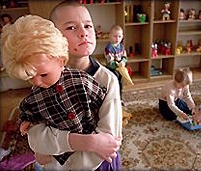RUSSIA'S SMALLEST VICTIMS

|
With Economic Collapse,
Children Are Facing
Increased Hardship
The number of Russian children
surrendered to state custody has doubled
over the past five years, to some 113,000
annually. This deaf girl -- like many
children at her juvenile detention center --
had her head shaved to help stop the
spread of lice. (Alexander
Zemlianichenko/AP Photo)
|
M O S C O W — Bath-time is over, and 20 girls
face one another in two straight, silent lines
along opposite walls of a corridor. Half are
combing their hair. The others watch; their
heads were shaved for lice as soon as they
arrived at the juvenile detention center.
This is a crossroads for Russia’s high-risk
children — between the tough life on the streets,
the stifling existence in state-run institutions, and
the alcoholism, violence and neglect some fled at
home.
The kids are in for everything from begging to
homicide. From here, some will be sent to prison,
others to orphanages, and many right back to their
families—only to run away again.
Unable to Cope
Many families have weathered Russia’s rocky
transition from communism, raising bright, healthy
and motivated children in spite of the social
upheaval. But others have proven unable to cope,
flooding state institutions and the streets of
Russian cities with neglected children.
“I don’t want to go home. I don’t want to go back
on the streets, either,” protests Julia, a sullen
15-year-old in black patent-leather pumps who was
arrested after she ran away from her family and
spent three months working as a prostitute.
“What am I supposed to do, go straight to the
cemetery and dig myself a grave?”
The economic slumps and legal chaos of the
eight years since the Soviet collapse have brought
long-standing problems of child neglect out into the
open.
Ragged children trudge through Moscow’s
subway trains, carrying hand-lettered signs with
appeals for money. Kids in thin jackets and torn
boots huddle over steam vents on the wintry
streets, sniffing glue, drinking vodka, killing time.
Home or Not?
The post-Soviet law on education has allowed
parents to keep their children out of school, in
exchange for a promise to teach them at home.
“Children 11, 12 years old end up on the streets,
washing windshields. They have papers saying
they’re studying at home, but who is there to teach
them?” said Tatyana Maximova, director of the
Juvenile Crime Prevention division of the city
police department., the juvenile cop.
And so they join the army of street children,
many of whom ended up homeless when their
parents sold apartments and houses. Marginalized
families — the poor, the mentally ill, alcoholics —
were the first targets of crooked real estate
speculators in the early 1990s, when their free
housing suddenly became a valuable commodity.
“People would sell apartments for a crate of
vodka,” said Oleg Zykov, a psychiatrist who heads
the No to Alcoholism and Drug Abuse foundation,
which works with street children.
State Struggles to Cope
More and more youngsters are ending up in state
custody only after spending time on the streets.
“Earlier it was easier, a lot of children were
coming from their homes,” said Natalya Kuryshova,
the deputy director of the Saltykov children’s home,
a 140-bed orphanage in a cheerfully decorated
brick building just east of Moscow.
“Now we have children who know what vagrancy
means, who’ve felt real hunger, who’ve been taught
to steal, who’ve used toxic substances.”
The latest economic crisis, which exploded in
August, has exacerbated the problem. Prices have
soared, already paltry state child-support
payments are almost worthless, and opportunities
for even the occasional job that kept many families
going for years have shrunk. Free lunch programs
have been cut back in many schools.
Tales of Abuse
The number of mothers and fathers stripped of parental
rights because of child abuse has grown.
Some of their children will be placed with relatives.
Others will enter the state system, where they’re marked
for life, often with incorrect diagnoses of mental and
physical problems that haunt them into their adult years.
Andrei Sadukhin’s case illustrates the vicious circle. He
was abandoned at birth and placed in an orphanage home
near Rostov, in southern Russia. At age 4, a doctors
commission judged him mentally handicapped and he was
channeled into an institution for the disabled.
The only tacit agreement that he was normal came from
the army, where Sadukhin served two years after leaving
the institution. But when he returned to Rostov to claim the
housing that is legally due to all orphans, he was refused,
and offered a place in a mental hospital — a locked
institution no better than a prison.
Today, the 23-year-old sleeps in doorways and
basements in Moscow.
Judith Ingram
|